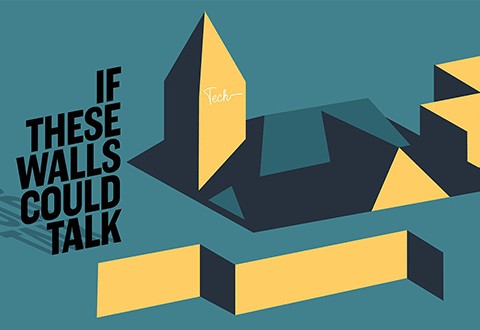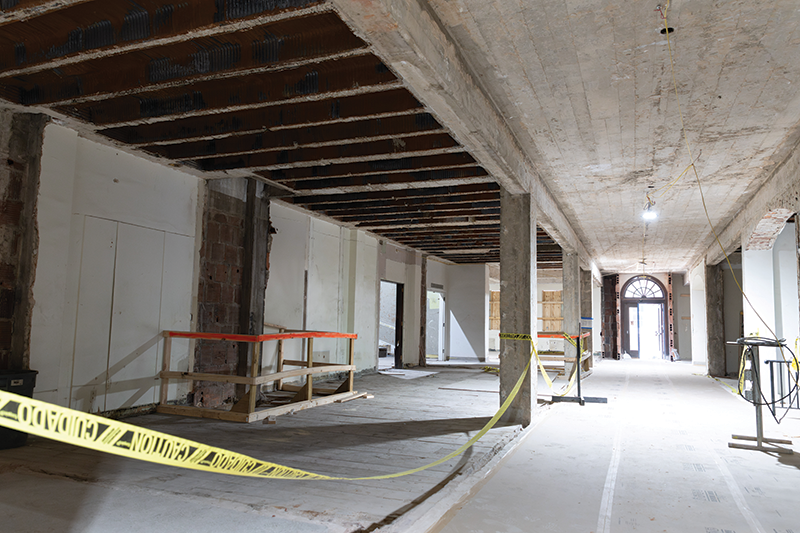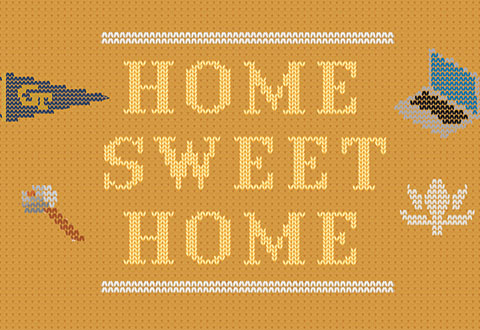A Season Interrupted
By: Jennifer Herseim, with assistance from Marilyn Somers, Hon 08, and Thomas Taylor, Mgt 72, Photos courtesy of Andy McNeil PP 01 | Categories: Tech History
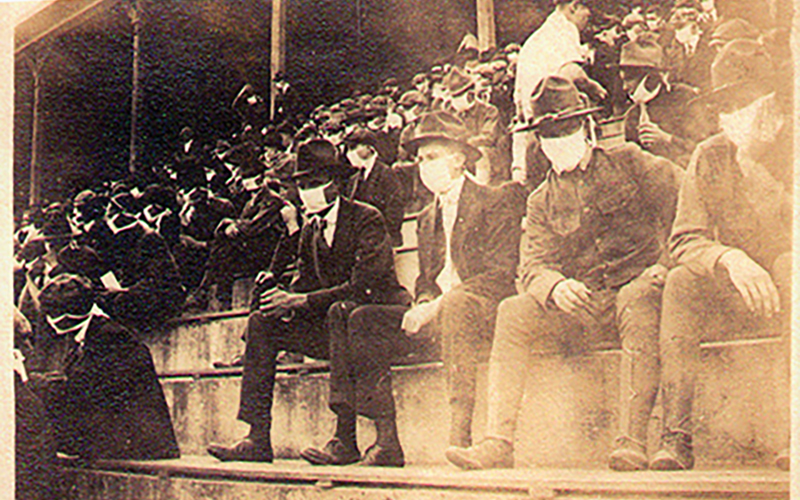
This spring, alumnus Andy McNeil, PP 01, shared a photo from 1918 taken by his great-grandfather, Thomas Carter, ME 1923. The image of fans wearing face masks at Grant Field to protect themselves from the influenza pandemic would become widely circulated more than a hundred years later during the coronavirus pandemic.
In an article this May in The Atlanta Journal- Constitution, Ken Sugiura connects the photo with an Oct. 12 game between Tech and Furman, which the paper, stating at the time, said, “drew many students, looking, in their influenza masks, like bandits of a mild sort.”
Banditry aside, there was a game scheduled a month after Carter took this photo that caused a stir at Grant Field and left more than 5,000 fans feeling robbed of a game.
The Game That Wasn't
The year was 1918. The Tech elevens, in their gold-hued uniforms, were coming off such a whirlwind of a winning streak that they had earned the sobriquet the “Golden Tornadoes.”
With John Heisman as head coach, they clinched the 1917 championship following an undefeated season.
A year before that, they put up the most lopsided win in collegiate football against Cumberland College (222-0).
With war and a pandemic still hanging over Atlanta, Tech’s football team was offering a needed distraction and fans were eagerly awaiting the season start. In September, the war department ruled that out-of-state team travel for military schools was restricted, leaving Tech without an opponent for several scheduled games. Camp Gordon, a military training camp located in Chamblee, Ga., was available to fill in.
Three highly anticipated games were scheduled between Tech and Camp Gordon for Oct. 26, Nov. 16, and Dec. 7.
At this point, Tech was averaging around 90 points per game. But Camp Gordon had hundreds of enlisted men who had previously played collegiate football. The Gordon lineup included “some of the most famous football stars that ever walked on the gridiron,” wrote The Evening News from Harrisburg, Pa., in an Oct. 23 article days before the matchup.
The first game did not disappoint. Instead of a hundred point landslide, Tech beat Camp Gordon by only 28-0, in one of its toughest games in years. They played “before the largest crowd that has ever attended a football game in Atlanta,” wrote the Associated Press the following day. The military had even erected additional stands on the east side of Grant Field.
Excitement over the next game, set for Nov. 16, quickly grew. Camp Gordon arranged for trolleys to transport fans from Chamblee. And, a band was set to perform on the field.
Days before the game, things were not looking good for Tech. The AJC reported that there were “small injuries in the heavy scrimmage work,” at practices. Two players, captain Bill Fincher and Frank Ferst, had incurred “badly bruised legs.” Oscar Davis, Tech’s center, was still out with a broken leg from a motorcycle accident that happened earlier in the season. Heisman was also not looking forward to facing Everett Strupper, one of Tech’s former stars from 1917, who was now playing on the opposing side for Camp Gordon.
A "Merry Mix-up"
When the day of the game finally arrived, more than 5,000 military fans and 500 others showed up to Grant Field. But, instead of the rematch they had expected, they found a sign saying the game had been called off.
Despite the sign on the gate, the crowd entered the field and waited in the stands from 1:30 p.m. until 4 p.m., demanding a game.
Why had the game been called off without notice to Camp Gordon?
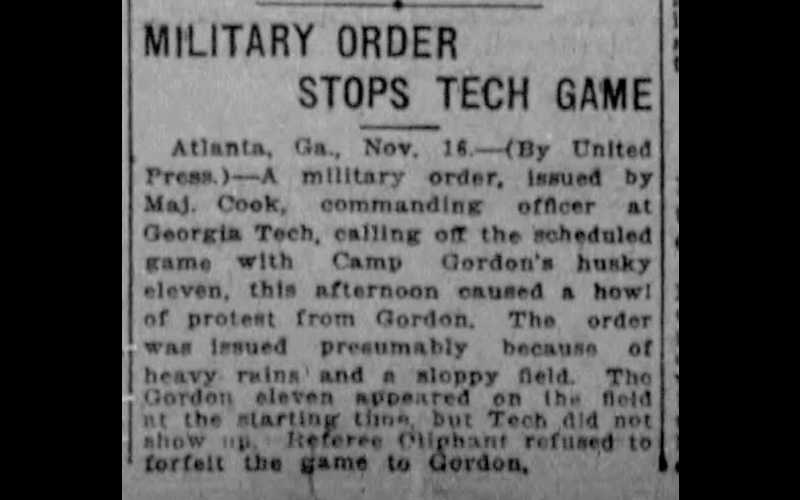 An article the next day in the AJC recalled a confusing back-and-forth between officials of both teams to find out who had called off the game and for what reason. The article called it “one of the merriest mix-ups of recent years.”
An article the next day in the AJC recalled a confusing back-and-forth between officials of both teams to find out who had called off the game and for what reason. The article called it “one of the merriest mix-ups of recent years.”
After calling Tech’s new military commander Major R.P. Cook, Tech President Kenneth G. Matheson, and others, Referee Oliphant finally worked out that Tech had called off the game due to heavy rain earlier in the day and based on Medical Officer Captain E. Schultz’s recommendations that morning.
In a statement the next day, Tech gave the following reasons for the cancellation: “the condition of the field and the weather and the possibility of influenza and pneumonia resulting if the boys played.”
Officials said they had tried to phone Camp Gordon the day of the game to deliver the news, but they were unsuccessful at reaching them in time.
With the out-of-state travel ban recently lifted, Tech was also expected to play rival Pitt for the championship title the Saturday following the Tech-Gordon game.
Rumors circulated in the papers about the reasons for the cancellation. Was Tech afraid to play Gordon after such a hard-fought win a month earlier? Were they saving players for the championship game against Pitt a week later? Or was it the rain earlier in the day, field conditions, and the possibility of the flu that led to the decision?
The reason behind the merry mix-up from 1918 may forever remain a mystery.
